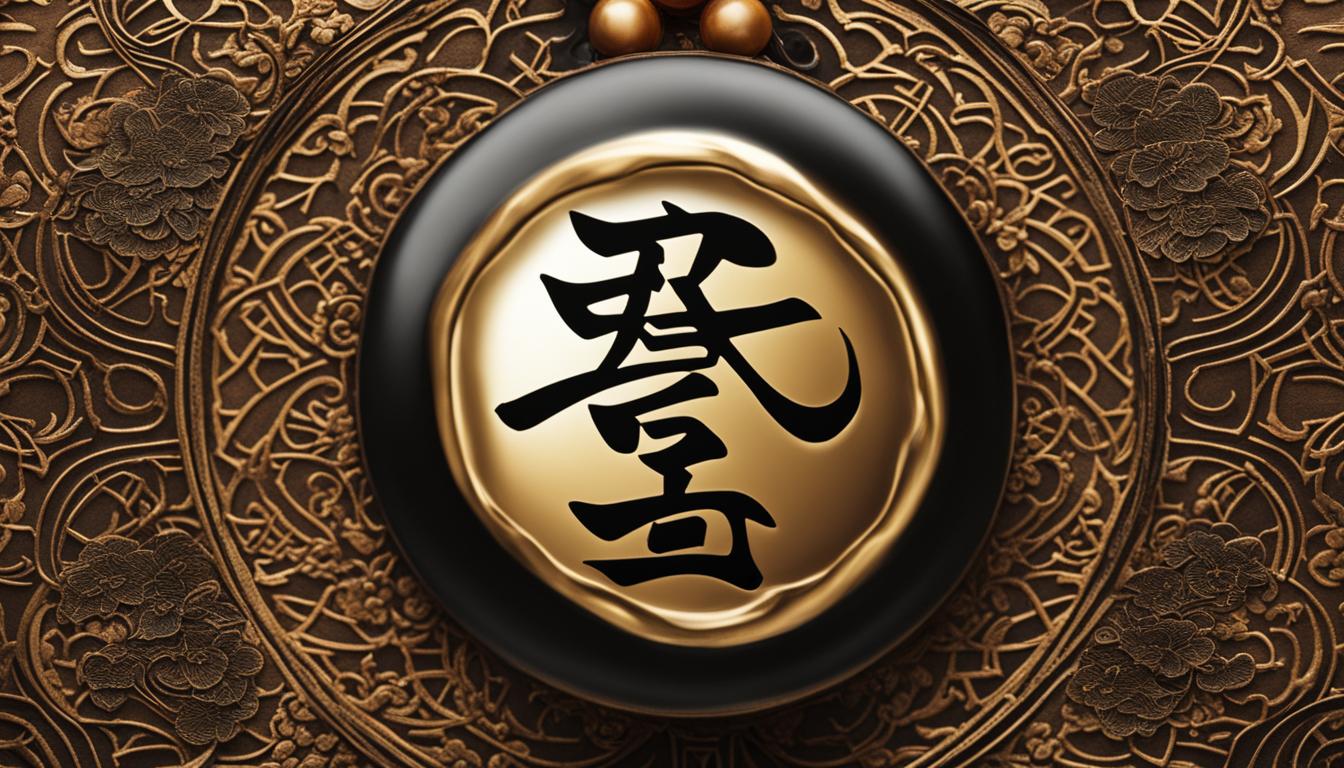Originally posted on November 24, 2023 @ 6:10 am
In Japanese culture, expressing good luck is important and there are several phrases you can use to convey this sentiment. If you’ve ever wondered how to say “good luck” in Japanese, you’ve come to the right place. In this quick guide, we’ll explore different Japanese expressions for good luck and provide translations for each phrase. Whether you’re planning to wish someone well or just curious about Japanese culture, this guide will help you navigate the world of good luck in Japan.
So, how do you say good luck in Japanese? Let’s find out!
Key Takeaways:
- Japanese culture emphasizes the importance of expressing good luck.
- There are several phrases to wish someone good luck in Japanese.
- Some common Japanese expressions for good luck include 頑張って (ganbatte), 応援しています (ouen shite imasu), and うまくいくといいね (umaku iku to ii ne).
- Understanding Japanese cultural customs and symbols associated with good luck can deepen your appreciation for Japanese culture.
- Learning the Japanese language and embracing the culture can enhance your overall experience in Japan.
The Meaning of Ganbaru

In Japanese culture, the word 頑張る (ganbaru) holds significant meaning. This verb translates to “to stand firm” or “to persevere” in English. However, it encompasses a deeper sense of going above and beyond one’s best efforts. Ganbaru represents the value of finding worth in the process of exerting effort, regardless of the outcome.
Throughout day-to-day conversations, ganbaru is commonly used to express determination, resilience, and the willingness to give one’s all. It embodies the cultural belief in the importance of persevering through challenges, even in the face of adversity. The variations of the word, such as 頑張って (ganbatte) and 頑張れ (ganbare), offer different tones and levels of formality.
The concept of ganbaru reflects the Japanese cultural ethos of valuing effort and honoring the journey towards a goal. It encourages individuals to embrace challenges, work diligently, and persistently strive for improvement. Ganbaru signifies the belief that success is not solely measured by the end result, but also by the dedication, determination, and resilience demonstrated throughout the process.
The different forms of “ganbaru”
| Ganbaru Form | Meaning |
|---|---|
| 頑張る (ganbaru) | To stand firm; to persevere; to do one’s best |
| 頑張って (ganbatte) | Do your best |
| 頑張れ (ganbare) | You can do it |
“Ganbaru embodies the cultural belief in the importance of persevering through challenges, even in the face of adversity.”
Ways to Say Good Luck in Japanese
In addition to the phrase 頑張って (ganbatte), there are several other ways to wish someone good luck in Japanese. Here are some different phrases you can use:
- 応援しています (ouen shite imasu) – This phrase means “I’m supporting you” and conveys encouragement and well wishes for success.
- うまくいくといいね (umaku iku to ii ne) – Translated as “I hope it goes well,” this phrase expresses optimism and positive wishes for a favorable outcome.
- 健闘を祈ります (kentou o inorimasu) – This phrase means “I pray for your success” and carries a sense of sincerity and earnest wishes for triumph.
Each of these phrases has its own nuance and can be used in different contexts depending on the level of formality or the relationship with the person you are wishing luck to. Choose the phrase that best fits the situation and conveys your genuine support.
Expressing good luck is an important aspect of Japanese culture, and learning these phrases can help you connect with others and demonstrate your understanding and appreciation of the language. Now, let’s take a look at a table summarizing the different ways to say good luck in Japanese:
| Phrase | Meaning |
|---|---|
| 頑張って (ganbatte) | Do your best |
| 応援しています (ouen shite imasu) | I’m supporting you |
| うまくいくといいね (umaku iku to ii ne) | I hope it goes well |
| 健闘を祈ります (kentou o inorimasu) | I pray for your success |
Remember, using these phrases is a meaningful way to show your encouragement and goodwill towards others. Whether it’s for exams, job interviews, or any other important event, wishing someone good luck in Japanese is a thoughtful gesture that can brighten their day.
Luck Symbols in Japanese Culture
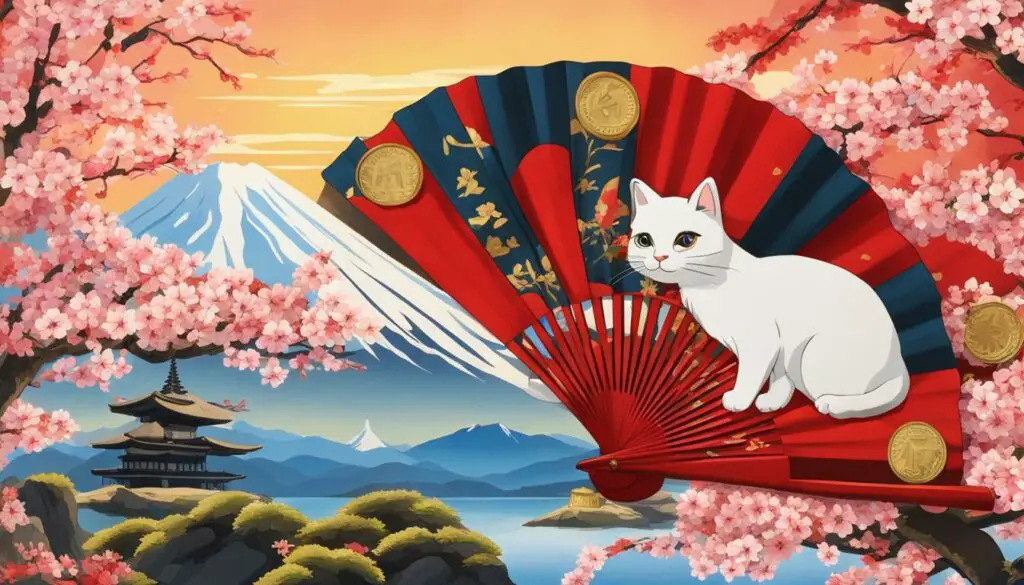
In Japanese culture, symbols and traditions associated with good luck hold deep significance. These symbols are believed to bring blessings, fortune, and positive energy into people’s lives. Let’s explore some of the lucky charms and symbols in Japanese culture:
Maneki Neko (Lucky Cat)
The Maneki Neko, also known as the Lucky Cat, is a popular symbol of good luck in Japan. This figurine is often seen in shops, restaurants, and homes, with its raised paw beckoning good fortune. It is believed that the Maneki Neko attracts wealth, prosperity, and happiness.
Koi Fish
The Koi fish is another symbol associated with good luck in Japanese culture. Known for their vibrant colors and graceful movements, Koi fish represent perseverance and longevity. These fish are often depicted in art and can be found in ponds and gardens, symbolizing good fortune and success.
Omikuji (Paper Fortunes)
Omikuji are paper fortunes that are commonly found at shrines and temples in Japan. Visitors can pick a rolled-up fortune, which contains predictions and advice for the future. Omikuji are believed to bring luck and guidance, and people often tie them to designated areas at the shrine or temple.
Omamori (Talismans)
Omamori are small amulets or talismans typically sold at shrines and temples. These charms are believed to provide protection and bring good luck to the person who carries or wears them. Common types of Omamori include those for health, success, love, and safe travels.
These are just a few examples of the many luck symbols in Japanese culture. They serve as reminders of positivity, perseverance, and the belief in the power of good fortune. Whether it’s the charming Lucky Cat, the graceful Koi fish, or the guidance offered by Omikuji and Omamori, these symbols add a touch of magic to the Japanese cultural landscape.
| Lucky Symbol | Meaning |
|---|---|
| Maneki Neko (Lucky Cat) | The raised paw beckoning good fortune and wealth. |
| Koi Fish | Symbolizes perseverance, longevity, and success. |
| Omikuji (Paper Fortunes) | Provides predictions and guidance for the future. |
| Omamori (Talismans) | Offers protection and brings good luck. |
Summary of Good Luck Phrases in Japanese
When it comes to wishing someone good luck in Japanese, there are several common phrases you can use to convey this sentiment. These phrases not only express your support and well wishes but also showcase your appreciation for Japanese culture. Below, we have summarized some of these phrases:
Ganbatte (頑張って)
One of the most well-known phrases for wishing good luck in Japanese is “ganbatte.” This phrase translates to “do your best” and is often used to encourage someone before an important event or challenge. It conveys the idea of perseverance and giving it your all.
Ouen shite imasu (応援しています)
If you want to express your support and let someone know that you are cheering them on, you can use the phrase “ouen shite imasu.” This phrase translates to “I’m supporting you” and is a great way to show your encouragement and positive energy.
Umaku iku to ii ne (うまくいくといいね)
When you want to express your hope for someone’s success or that things go well for them, you can say “umaku iku to ii ne.” This phrase means “I hope it goes well” and conveys your positive thoughts and wishes for their endeavors.
Kentou o inorimasu (健闘を祈ります)
If you want to show your prayers and well wishes for someone’s success, you can use the phrase “kentou o inorimasu.” This phrase translates to “I pray for your success” and expresses your sincere hopes for their achievements and positive outcomes.
By using these common phrases, you can not only wish someone good luck in Japanese but also showcase your understanding and appreciation for Japanese culture. Whether it’s a simple “ganbatte” or a heartfelt “kentou o inorimasu,” these phrases are sure to bring a smile and positive energy to the recipient.
Start Learning Japanese with Ling
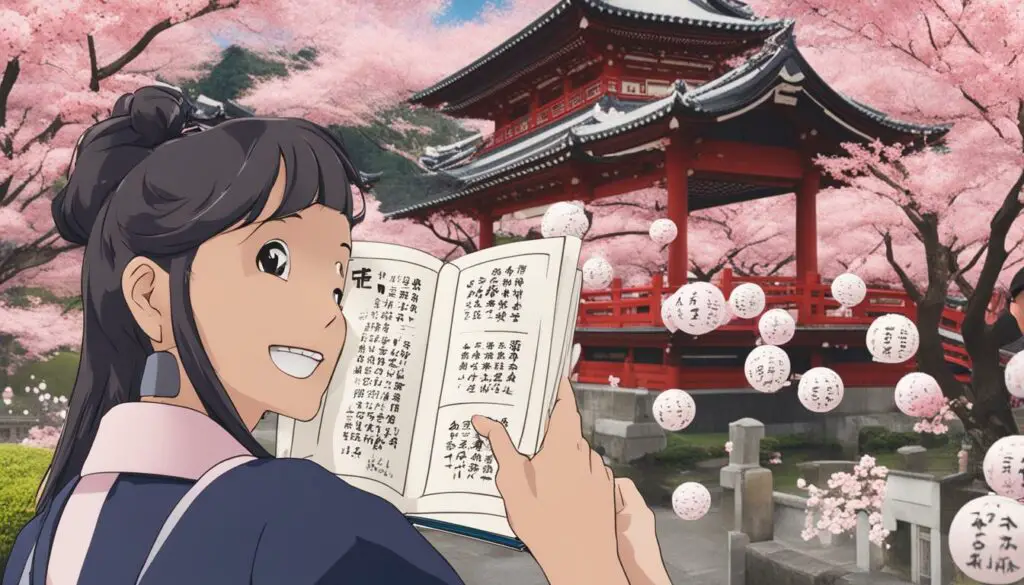
If you’re interested in learning more Japanese phrases and improving your language skills, consider using Ling, an easy-to-understand language learning app. With Ling, you can learn at your own pace and have access to bite-sized lessons, puzzles, and a chatbot to practice real-life conversations. Download Ling from Google Play Store or Apple App Store and start speaking Japanese with confidence.
| Ling Features | Description |
|---|---|
| Bite-sized Lessons | Learn Japanese phrases and grammar through short and interactive lessons that are easy to follow. |
| Puzzles and Games | Sharpen your language skills with fun puzzles and games that reinforce your learning. |
| Chatbot Practice | Practice real-life conversations with Ling’s chatbot, which provides instant feedback and correction. |
| Personalized Learning | Ling adapts to your learning style and provides personalized recommendations to help you progress faster. |
Learning a new language can be challenging, but with Ling, it becomes an enjoyable and rewarding experience. Whether you’re a beginner or looking to enhance your existing language skills, Ling has the resources and tools to support your language learning journey. Start learning Japanese phrases today and open the doors to a whole new world of language and culture.
“Ling is like having a language tutor in your pocket. The lessons are concise and effective, and the chatbot feature is incredibly helpful for practicing conversations. I highly recommend it!” – Sarah, Ling user
Why Choose Ling?
- Easy-to-use interface for a seamless learning experience.
- Accessible on both iOS and Android devices.
- Engaging and interactive lessons for effective language acquisition.
- Flexible learning options to fit your busy schedule.
With Ling, you can embark on your Japanese language learning journey with confidence and convenience. Download Ling today and discover the joy of speaking Japanese.
Good Luck in Japanese Culture
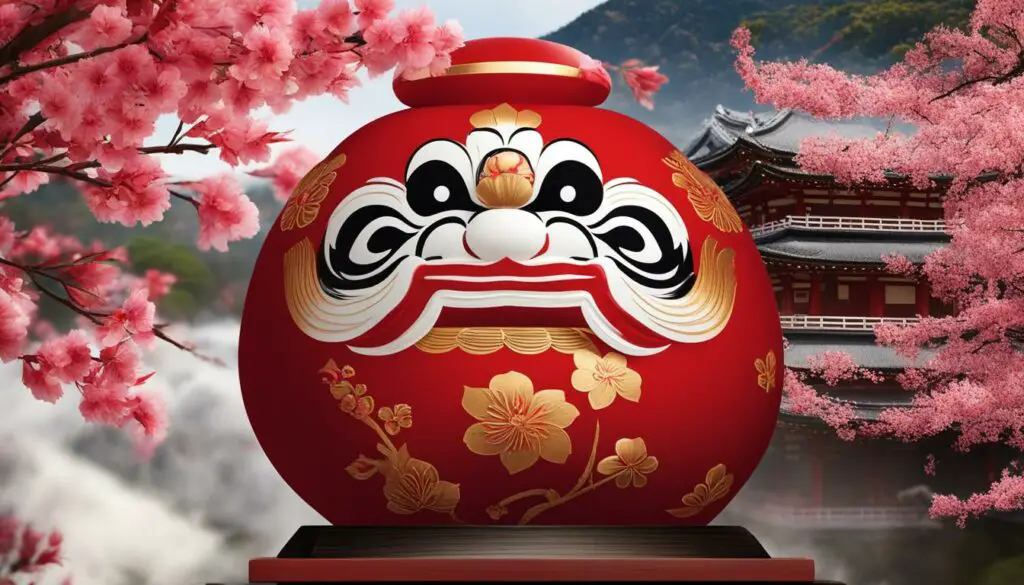
Expressing good wishes and wishing someone luck is an important part of Japanese culture. It is seen as a way to improve cultural understanding and connect better with locals. The Japanese believe in the value of effort and perseverance, as reflected in phrases like 頑張って (ganbatte). Understanding these cultural customs can help you navigate social interactions and deepen your appreciation for Japanese culture.
Cultural Customs for Good Luck
Table: Good Luck Customs in Japanese Culture
| Custom | Description |
|---|---|
| Visiting Shrines and Temples | In Japan, it is common to visit shrines and temples to seek blessings and good fortune. People often make offerings and pray for luck in various aspects of life. |
| Purchasing Omamori | Omamori are small talismans that are believed to bring protection and luck to the owner. They are commonly sold at shrines and temples and can be carried or kept in homes or vehicles. |
| Engaging in Rituals | There are specific rituals and practices associated with different occasions in Japan. For example, during the New Year, it is customary to perform Hatsumode, the first visit to a shrine or temple in the new year, to pray for good fortune. |
These customs are deeply rooted in Japanese society and have been passed down through generations. By observing and participating in these cultural practices, you can gain a deeper understanding of Japan’s rich heritage and show respect for local traditions.
Quote: “By embracing the cultural customs and traditions of Japan, you can strengthen your connections with the local community and create memorable experiences during your time in the country.” – Japanese Cultural Expert
Embracing the customs associated with good luck in Japanese culture allows you to engage more fully with the local community and foster deeper connections. It demonstrates your respect for the traditions and values that are important to the Japanese people. Whether it’s visiting shrines and temples, purchasing omamori, or participating in cultural rituals, immersing yourself in these customs will enrich your overall experience in Japan.
Through an understanding of good luck customs in Japanese culture, you can gain cultural sensitivity, foster meaningful connections, and enhance your cultural immersion in Japan. Embrace the richness of Japanese traditions and values, and you will find yourself enriched by the experience.
Elements of Good Luck in Japanese
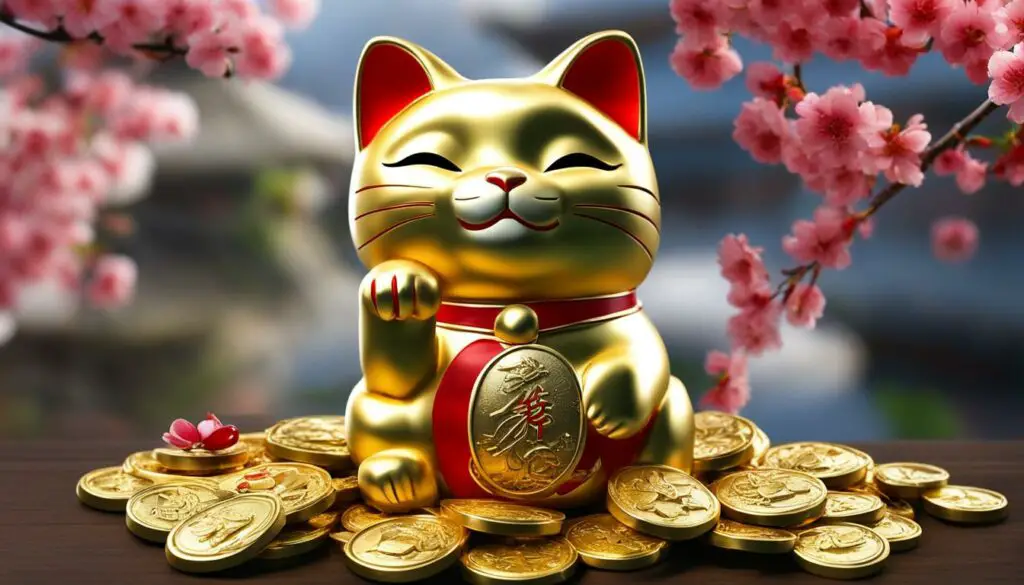
In Japanese culture, various elements and symbols are associated with good luck and are believed to bring blessings and fortune into one’s life. Understanding these elements can deepen your appreciation for Japanese culture and its rich traditions. Let’s explore some of the prominent symbols for good luck in Japan.
Maneki Neko (Lucky Cat)
The Maneki Neko, also known as the Lucky Cat or Beckoning Cat, is a popular symbol of good luck in Japan. This figurine is often seen in shops, restaurants, and homes, with its raised paw believed to invite good fortune and prosperity. The color of the cat’s design holds significance as well, with white symbolizing general good fortune, black representing protection against evil spirits, and gold signifying wealth and prosperity.
Koi Fish
Koi fish are another powerful symbol of good luck in Japanese culture. The koi, known for its vibrant colors and energetic nature, represents perseverance, strength, and overcoming adversity. It is believed that if a koi fish successfully swims upstream and reaches its destination, it transforms into a dragon, a symbol of ultimate success and achievement. The presence of koi fish in ponds and gardens is considered auspicious and brings good luck.
Omikuji (Paper Fortunes)
Omikuji are traditional paper fortunes that can be obtained at shrines and temples in Japan. These fortunes provide predictions and guidance for various aspects of life, including love, health, and career. The omikuji are typically written in poetic form and classified into different categories, such as “great blessing,” “small blessing,” “average blessing,” and “curse.” It is believed that tying the fortune to a designated place, often in the shrine or temple, can help bring good luck or ward off misfortune.
By understanding and appreciating the elements associated with good luck in Japanese culture, you can gain a deeper insight into the beliefs and traditions of the Japanese people. These symbols not only add charm to the cultural landscape but also serve as reminders of the importance of perseverance, prosperity, and spiritual guidance.
How to Wish Someone Luck in Japanese
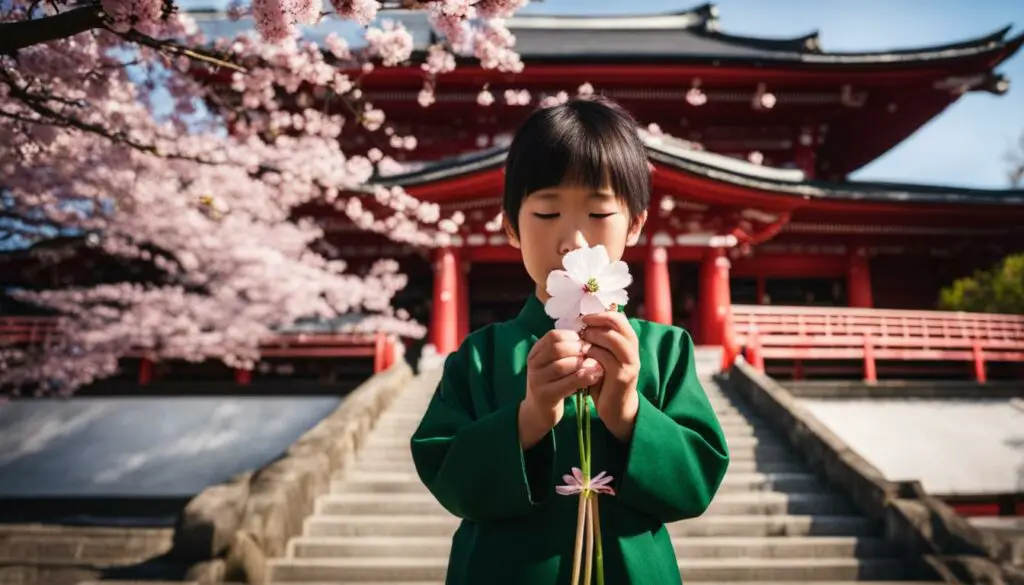
When it comes to expressing good luck in Japanese, there are several phrases you can use to convey your support and well wishes. One commonly used phrase is 頑張って (ganbatte), which translates to “do your best” or “give it your all.” This phrase is often used to wish someone luck for important events such as exams, job interviews, or any challenging endeavor they may face.
For a more casual tone, you can use the phrase 頑張ってね (ganbatte ne), which carries a similar meaning but is a bit more relaxed. On the other hand, if you want to show a higher level of formality and politeness, you can use 頑張ってください (ganbatte kudasai), which means “please do your best.”
Another way to express good luck in Japanese is by using the phrase 応援しています (ouen shite imasu), which means “I’m supporting you.” This phrase conveys not only the idea of wishing someone luck but also letting them know that you are there to cheer them on.
When choosing the right phrase to wish someone luck in Japanese, consider the level of formality and your relationship with the person you’re addressing. Whether it’s 頑張って, 応援しています, or any other phrase, expressing your support and well wishes will surely be appreciated.
Japanese Cultural Customs for Good Luck
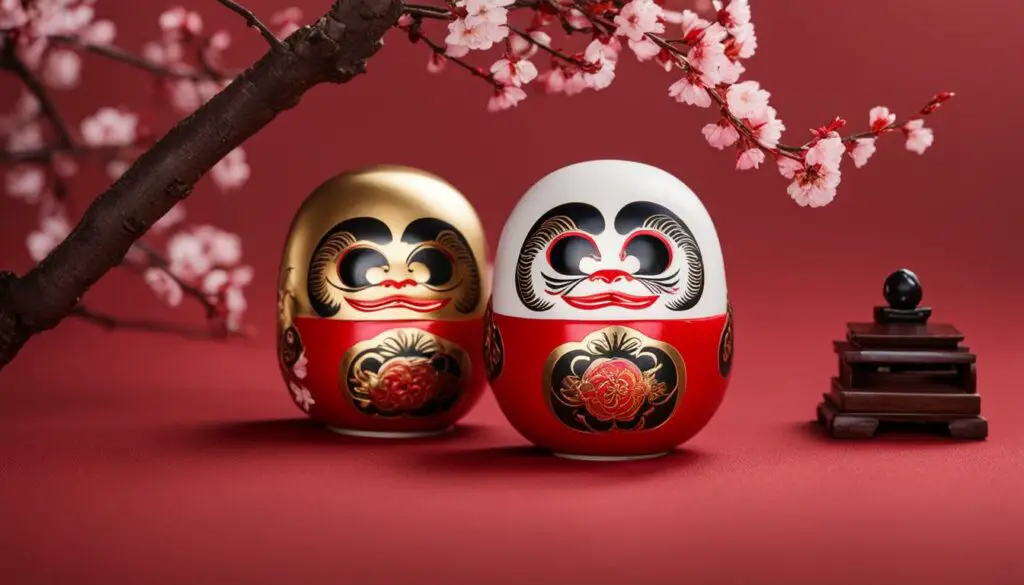
In Japanese culture, there are numerous customs and traditions associated with good luck. These practices reflect the deep-rooted belief in the power of positive energy and the desire for auspicious outcomes. Understanding and respecting these customs can provide insight into the rich cultural heritage of Japan and allow you to fully immerse yourself in the local way of life.
One significant tradition is the visitation of shrines and temples. People often seek blessings and good fortune by paying their respects at these sacred sites. They may offer prayers, purchase omamori (talismans), or participate in specific rituals and ceremonies. These acts demonstrate reverence for the divine and a desire for protection and success in various aspects of life.
Another common custom is the exchange of gifts or tokens believed to bring luck. For example, the giving of omamori to loved ones is a gesture of goodwill and a wish for their well-being. These beautifully crafted talismans are designed to provide protection and bring good fortune to the recipient. By embracing this custom, you can establish deeper connections with others and demonstrate your appreciation for Japanese culture.
“In Japanese culture, there are numerous customs and traditions associated with good luck.”
| Custom | Meaning |
|---|---|
| Visiting shrines and temples | Seeking blessings and good fortune |
| Exchanging omamori | Wishing well-being and protection |
| Engaging in rituals and ceremonies | Invoking positive energy and success |
By participating in these customs, you not only show respect for Japanese traditions but also invite positive energy and good luck into your own life. Embracing these cultural practices can deepen your understanding of Japan’s rich heritage and enhance your overall experience in the country.
Embrace the Japanese Language and Culture
Immersing yourself in the Japanese language and culture is an enriching experience that allows you to connect with locals on a deeper level. By embracing the Japanese language, you not only gain the ability to communicate effectively but also show a genuine interest in the culture and people of Japan. Whether you plan to travel, study, or work in Japan, learning the language is a valuable skill that opens doors to new opportunities.
Learning Japanese goes beyond just mastering vocabulary and grammar. It provides insights into the unique nuances of the language, allowing you to understand the cultural context in which it is spoken. By immersing yourself in Japanese language and culture, you gain a deeper appreciation for the country’s rich heritage, traditions, and customs.
Additionally, embracing the culture allows you to navigate social interactions more effectively. Japanese customs and etiquette play a significant role in daily life, and by familiarizing yourself with these practices, you demonstrate respect and understanding towards the local community. This not only enhances your experience in Japan but also fosters meaningful connections with people you meet along the way.
The Benefits of Cultural Immersion in Japan
When you immerse yourself in Japanese culture, you gain a deeper understanding of the values, beliefs, and traditions that shape the country. Cultural immersion allows you to experience firsthand the beauty of Japanese arts, such as traditional tea ceremonies, calligraphy, and flower arrangement. It also provides opportunities to participate in festivals and celebrations, where you can witness the vibrant spirit and sense of community that defines Japanese culture.
Moreover, cultural immersion allows you to develop a global mindset and become more adaptable to different environments. As you interact with locals and navigate everyday life in Japan, you learn to appreciate diversity and broaden your perspective. This cross-cultural understanding not only enriches your personal growth but also enhances your professional opportunities in an increasingly interconnected world.
In conclusion, embracing the Japanese language and culture is a gateway to a deeper understanding and appreciation of Japan. By learning the language, familiarizing yourself with customs, and immersing yourself in the cultural experiences, you can create a more meaningful and fulfilling experience in Japan. So, take the leap, embrace the richness of the language and culture, and embark on a transformative journey in the Land of the Rising Sun.
Conclusion
In conclusion, expressing good luck in Japanese is an important aspect of the culture. By using phrases like 頑張って (ganbatte) and understanding their variations, you can convey your support and well wishes to others. Additionally, exploring the symbols and customs associated with good luck, such as the Maneki Neko and Omamori, can deepen your understanding of Japanese culture and beliefs.
Learning the Japanese language and embracing the culture can greatly enhance your overall experience in Japan. By immersing yourself in the language and cultural customs, you can better connect with locals and gain a deeper appreciation for the rich traditions of Japan. Whether it’s wishing someone luck or exploring the elements of good luck, embracing the Japanese language and culture is a wonderful way to connect and engage with this fascinating country.
So, don’t hesitate to wish someone good luck in Japanese and embrace the beauty of the language and culture. By incorporating these phrases and customs into your interactions, you’ll not only show your respect and understanding, but you’ll also be able to forge meaningful connections and fully experience the richness of Japan’s heritage.
FAQ
How do you say good luck in Japanese?
The phrase for good luck in Japanese is 頑張って (ganbatte).
What does 頑張って (ganbatte) mean?
頑張って (ganbatte) means “do your best” or “give it your all”.
What are some other phrases for wishing good luck in Japanese?
Other phrases for wishing good luck in Japanese include 応援しています (ouen shite imasu) which means “I’m supporting you”, うまくいくといいね (umaku iku to ii ne) which means “I hope it goes well”, and 健闘を祈ります (kentou o inorimasu) which means “I pray for your success”.
What symbols are associated with good luck in Japanese culture?
Some symbols associated with good luck in Japanese culture include the Maneki Neko (Lucky Cat), Koi fish, Omikuji (paper fortunes), and Omamori (talismans).
How can I start learning Japanese?
You can start learning Japanese by using Ling, an easy-to-understand language learning app that offers bite-sized lessons, puzzles, and a chatbot for practicing real-life conversations.
What is the significance of expressing good luck in Japanese culture?
Expressing good luck is seen as a way to improve cultural understanding and connect better with locals in Japanese culture.
What elements are associated with good luck in Japanese culture?
Elements associated with good luck in Japanese culture include symbols such as the Maneki Neko (Lucky Cat), Koi fish, and customs like visiting shrines and temples, purchasing omamori (talismans), and engaging in specific rituals or practices during certain occasions.
How can I wish someone luck in Japanese?
You can wish someone luck in Japanese by using phrases like 頑張って (ganbatte) or 応援しています (ouen shite imasu) to show your support.
What are some cultural customs associated with good luck in Japan?
Cultural customs associated with good luck in Japan include visiting shrines and temples, purchasing omamori (talismans), and engaging in specific rituals or practices during certain occasions.
How can embracing the Japanese language and culture enhance my experience in Japan?
Embracing the Japanese language and culture can help you connect with locals, gain a deeper understanding of Japan, and enhance your overall experience in the country.
